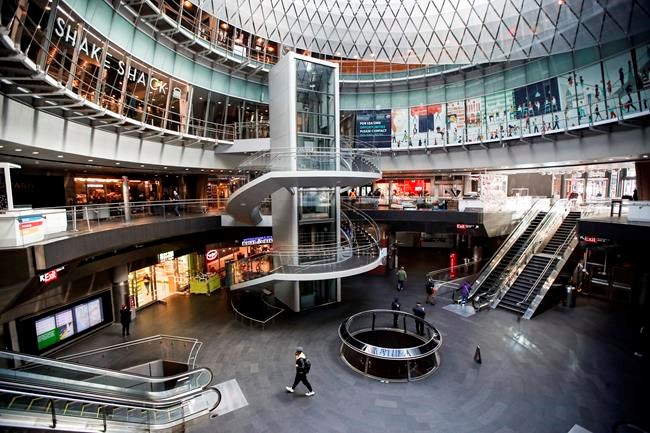NEW YORK — Bars and restaurants will become takeout-only and businesses from movie
The governors said essential businesses such as supermarkets and gas stations will be able to stay open after 8 p.m. Monday, though all non-essential businesses must close in New Jersey and Connecticut. New York Gov. Andrew Cuomo said he is “strongly encouraging” non-essential businesses to close in New York after 8 p.m.
Restaurants will be able to offer take-out and delivery, and many were scrambling Monday to figure out how to stay afloat in a rapidly shifting landscape.
“It’s a learning process and adjusting period for everybody,” said Zack Stapelman, manager of Smith St. Bagels in Brooklyn. “We'll make sure you're still getting your bagels.”
The steps mark the latest escalation of efforts to keep people apart in the New York metropolitan area in hopes of curbing the spread of the virus, and an attempt to
“It's chaos. I think it actually feeds the feeling that the country's out of control," Cuomo said during a joint conference call with the other governors. “There is no clear direction, there is no clear path.”
New York City bars and restaurants were already set to shut their dining rooms and take up their barstools Tuesday morning, under a plan that Democratic Mayor Bill de Blasio announced Sunday.
Around the city, bar owners and restaurateurs were slashing staffing and closing their doors, not knowing when they might reopen.
“We've been through other stuff, but nothing this,” said Suzanne Riva, co-owner of Follia, an Italian restaurant in the Gramercy
Riva said she hopes to double her daily delivery business from regulars who said they will place orders to support the restaurant. But she'll be operating with a staff of five, including herself — down from the usual 35 to 40.
Business has been down significantly at Veselka, a Ukrainian diner and
“We’ve always prided ourselves on staying open and being here for the
Amy Collado, a waitress at the restaurant for about a year and a half, worried about how she will make ends meet and continue helping to support her mother, who has a minimum-wage job.
“Maybe I’ll have enough money for rent, but what else am I going to need ?” she said. “What happens if I get sick or what happens if I run out of food? Those are the things I didn’t want to think about, especially with a restaurant job.”
Illinois, Ohio, Massachusetts and Washington state also are among places that have ordered bars to close and restaurants to stop dine-in service.
For most people, the virus causes only mild or moderate symptoms, such as fever and cough. For some, especially older adults and people with existing health problems, it can cause more severe illness, including pneumonia, and death.
The vast majority of people recover. According to the World Health Organization, people with mild illness recover in about two weeks, while those with more severe illness may take three to six weeks to recover.
In addition to the closures, the governors said that crowds will be limited to 50 people effective at 8 p.m.
It's unclear when business will return to normal.
The governors said essential businesses including supermarkets, gas stations and pharmacies will remain open.
How New York's and Connecticut's tribal casinos will be affected is not clear. Connecticut is “strongly urging their tribal partners to close tribal casinos,” according to Connecticut Gov. Ned Lamont.
Sherry Giordano, an Atlantic City casino regular from Willow Grove, Pennsylvania, had a trip booked for this weekend that will be
“I’m less concerned with my own safety and I think a lot of people have a tendency to think that way, which is both kind of stupid and selfish because we can endanger others,” she said. “I not only love gambling, I love meeting people and escaping reality. Atlantic City is very important to me and my husband. But I think it's the right thing to do. I would rather err (on the side of) caution rather than jeopardize a life.”
___
Associated Press writers Susan Haigh, Wayne Parry, Michael Hill, Marina Villeneuve, Mike Catalini, Joyce Rosenberg, David Porter, Robert Bumsted and Jim Mustian contributed to this article.
Jennifer Peltz, The Associated Press

